'I had a remarkably unambitious childhood,' Abhishek Majumdar of the Indian Ensemble theatre group
On a balmy Sunday evening in Bangalore, if you are headed towards Rangashankara to watch an acclaimed popular play, then it is most likely to a play by the Indian Ensemble theatre group. Any discussion on the current theatre trends in India would feature them prominently. They have managed to capture the imagination of audience across all age groups, not just in India, but across the globe.
The face of this very popular theatre company is its playwright and director Abhishek Majumdar. He is also one of its founder members. This is the story of Abhishek Majumdar, which is no less theatrical.
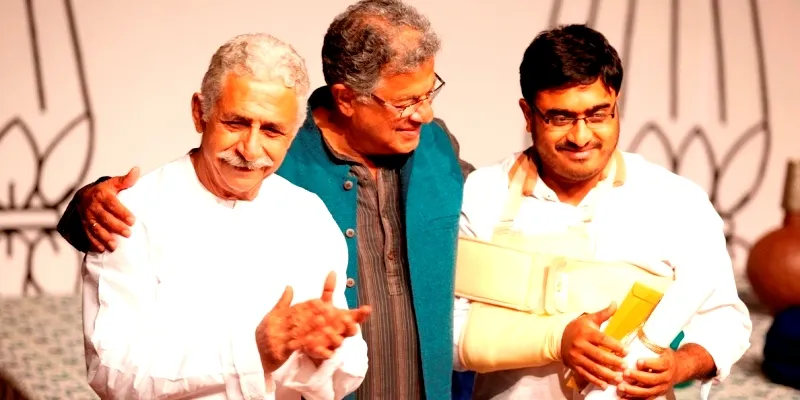
A unique childhood
Abhishek fondly recollects his childhood and early adulthood in the JNU, Delhi campus, where he lived with his parents, who were both working there. His father was into administration, and his mother was in the library. Watching his mother play Hindustani classical instruments, Abhishek developed a keen ear for music. Students from JNU preparing for public service exams often lodged at his place during their holidays. Thus, Abhishek was exposed to a wide array of subjects ranging from genetics to history, literature to science, political science to philosophy.
When you live in a college campus, you don't have one home. Every door is open. You visit any teacher, and professors walk in to your place. I would watch Sitaram Yetchury come home and have long and interesting debates with my father. Although I would not understand anything they said, this had an impact on my upbringing. I remember that Rajat Dutta, now the HOD of History Department, used to stay at my home as paying guest. He would lecture for a few hours and then sit in a closed room, and spend his time reading, thinking and writing. I would wonder how this can be a profession? I would bring him tea, and ask, 'will you acknowledge me in your book for serving you tea?' He would say, 'I'll acknowledge you for not allowing me to write my book.'
Abhishek's father passed away when he was five. He completed his schooling from Tagore International School. Abhishek recalls his school being very lenient with students having a lot of free time and opportunity to explore their creative pursuits. Surrounded by consulates, the school had many Commonwealth students, particularly from Africa and the Middle East.
Despite the exposure he received at an early age, Abhishek was extremely unambitious. Unlike typical Indian households, there was no pressure from his family to decide on his career either. Reading didn't interest him. His elder sister was pursuing Masters in English Literature and would tell him stories, including censored versions of Jane Austen. His little exposure to theatre came when Robin Das from the National School of Drama visited his school to conduct theatre workshops. Before he could delve deeper into theatre, his mother passed away. He was 15.
Indian Ocean connection
For the first time, the idea of having a career kicked in. Abhishek stayed with his older sister and his brother-in-law, and while pursuing his Bachelors degree from the University of Delhi, started visiting Susmit Sen, the guitarist of Indian Ocean band. They became good friends too. He watched the band rehearse every day after college.
More importantly, I would see, how wonderful it is to be an artist. What it is to be uncompromising in life.
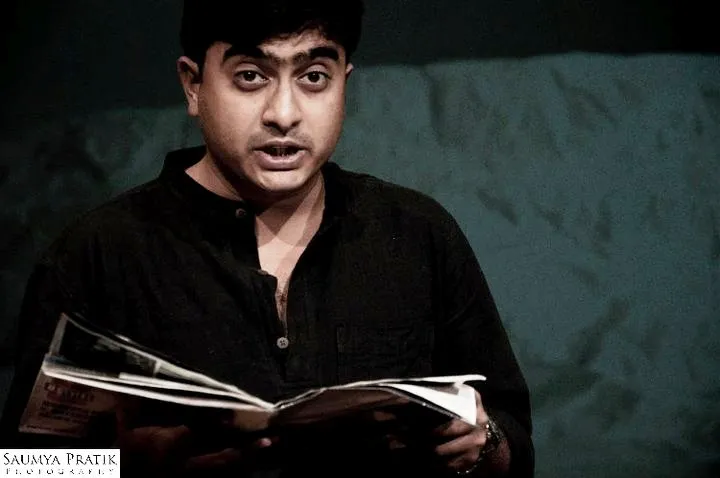
Soon, he received a scholarship from Enron. At the age of 19, he was now attending college while working for an e-commerce startup. He processed their charts and maps and enjoyed his work. But soon, the hollowness of working in a corporate job seeped in. He found hard to relate with his job and quit. After completing his Bachelors degree, he joined XIM Bhubaneswar to pursue a Masters degree in Rural Development. During the programme, he worked in villages; some accessible only through boats. It was in XIMB, where his interest in theatre was rekindled.
Being in a Business School, we found every student joining a student club, the marketing and financial clubs being the most popular ones. We started this theatre club. Initially there were only five of us. But soon, the club was swarming with people. I've heard the club has really grown now, and the number of applicants is so high, that they now undergo an audition to be a part of the club.
Before he could complete a year in XIMB, he received a call from REC, Trichy. Attracted by the lower fees and the chance for a better future, Abhishek joined REC. He completed his post graduation there, but did not like the course.
It was a standard college. You are sure to get a job after completing the degree, and so in essence, the education model was very boring and tedious. Suddenly, I had so much purpose in life that it seemed to be a waste of time. I made a few good friends, but they were equally bored. We were the cream of the country and two years later, thrown out of the milk. The only good thing REC did was to make me realize that I would never be able to do a desk job.
Bangalore to London and back
Meanwhile, Abhishek's older sister had shifted abroad. After passing out from REC, he had the choice of settling down anywhere in India. He chose Bangalore because of its good weather. A day after he arrived in Bangalore, Rangashankara was started. He wanted to attend the opening ceremony, but the tickets were sold out. Mahesh Dattani's acting workshop caught his attention, and he joined it. For a day job, he worked at Sonata Software. He loved his work there. His team was so encouraging that on the day his first play opened, his whole team was by his side, helping him backstage.
A friend suggested that I write. I soon wrote a story and approached Mahesh with it. Mahesh asked me to join the writer's workshop. I told him that I was already in the actors workshop and would not be able to afford another course. Mahesh offered me a scholarship.
Mahesh Dattani's workshop was really helpful. Abhishek, along with a few other students from the workshop, had started a theatre company called 'Mayavan'. After completing seven plays as an actor and three plays as the writer and director, in 2006, Abhishek received a call for a scholarship degree in Environmental Economics from Cambridge University. Soon afterwards, he received a call from the London International School of Performing Arts to pursue a masters degree learning theatre as part of a fellowship. He chose theatre. He left his job and went to London. A year later he came back to Bangalore and spent the next year trying to understand the ground realities and requirements of theatre in India. Next year, he visited London again to complete his degree on another fellowship.
I was not sure whether I wanted to stay in London and work there, visit Stanford and finish my PhD, or come back to India and work on plays here. It was during this time of confusion that I visited a Sudanese friend who stayed in London. His country was undergoing a civil war and he was watching on TV his city filled with rioters and tanks. I asked him what the news was today. He showed me the newspaper, which had something written about Brittany Spears. It was shocking how disconnected he was with his country and people. It was that moment when I decided to come to India.
Indian Ensemble
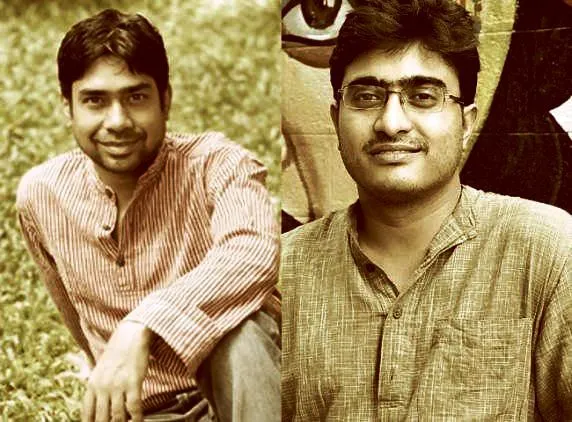
Abhishek returned back to India in 2009. He had come to believe that unless it becomes imperative for someone to be an artist, one should not attempt to do so. Being an art lover makes a great audience, but to create art, a certain sense of madness was required. He was not too worried about his future, either.
Most of the things that happen to us are not things we choose. We don't choose our parents, siblings, schooling. In most cases, we don't choose how much we earn, when we are born or when we die. I prefer looking at the immediate future, and believe in uncertainty.
In 2009, Indian Ensemble was started. The name was inspired by the Indian Ocean band. The idea was to build an open multi-lingual theatre company which would produce and support theatre work. Through plays, he wanted to tell tales of contemporary society, culture and politics. Functioning actively as a laboratory for research and training in various processes of theatre and performance was equally important.
I was a little confused on how to structure my theatre company. I believed in collaboration and was not at all competitive. I had learnt professionalism from my college and day job, but believed that family is the only social order everyone will understand. Indian Ensemble is structured like a family. We are an open group, and open to ideas, actors, directors, designers and playwrights. Valuing the time and talent of each collaborator, we divide our earnings equally.
The first play by Indian Ensemble was 'Treadmill', written by Sandeep Shikhar, the Co-founder of Indian Ensemble. The play was showcased in multiple versions and became very popular. The play had over 40 shows in Bangalore alone, and was featured in the Bareilly National Theatre Festival. 'Treadmill' was Indian Ensemble's rise to fame.
I had met Sandeep in 2008 during my interim visit to India. He had written 'Treadmill' and wanted me to direct it. I had to return to London, but promised to do his play when I came back. He received many invitations to do his play with other groups, but he waited for my return. When I came back from London, I had done three Masters degrees, and was 29. He was probably 33 years old. Both of us were unemployed, broke, and married. None of us had any rehearsal space. But we did the play, anyway.
The journey so far
The next play by Indian Ensemble was 'Rizwan', which was based on the Kashmiri poet Agha Shahid Ali's collection of poems, 'The country without a post office'. The play needed a larger cast, and was opened in Pune with students from the Film and Television Institute of India handling production and logistics. Soon afterwards, Neel Chaudhuri visited from Delhi and directed his next play, 'Harlesden High Street'. The play was set in the street by the same name in London, known for its high crime rate and immigrant population, comprising mainly Jamaicans, Poles and Pakistanis. The play explored the lives, aspirations and frustrations of the working class through the voices and accounts of three Pakistani immigrants. It won the Hindu Metroplus Theatre award and opened in their theatre festival.
Theatre is a hugely abstract form. It derives from music, painting, literature, and creates something different from these art forms. Like cinema and music, theatre is a function of time. It is a temporal art form, unlike architecture or painting, which are spatial. You have to watch a play from beginning to end. A play can shrink, expand, evolve, dilute, and converse like music.
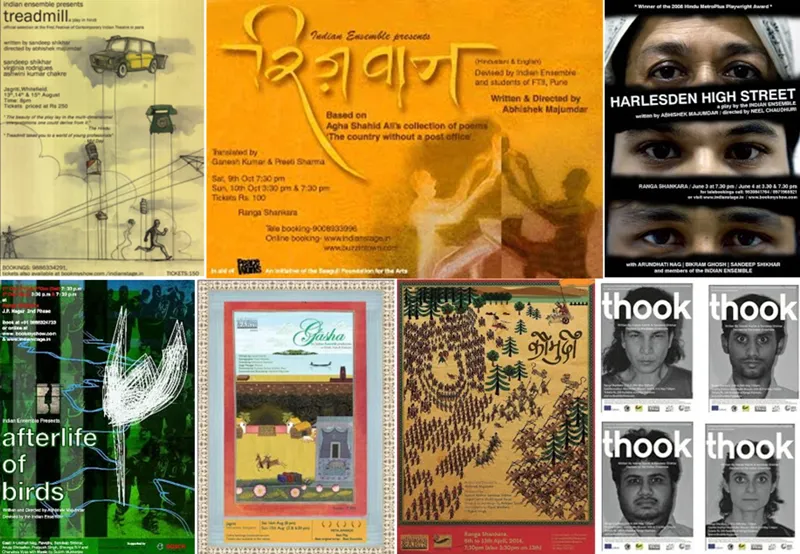
The Ensemble soon received the Robert Bosch art grant, which they utilized to come up with their next play, 'Afterlife of Birds'. The play featured in the International Theatre Festival of Kerala and the Bareilly National Theatre Festival. Their next play was 'Gasha', written by Irawati Karnik. 'Gasha' was a story of a friendship between two boys, a Kashmiri Pandit and a Kashmiri Muslim, and the clash of their identities. The team visited Kashmir in order to conduct their research, and the play was based on real stories, interviews and testimonials. 'Gasha' had numerous shows across the country, and questioned the ideas of identity and nationalism at the very fundamental level. The play also won three awards at the Mahindra Excellence in Theatre Festival.
Their next play was 'Kaumudi', which was an experimentation with the form. The play was extremely well received in Bangalore, Bareilly, Pune, Delhi and Lucknow. Kaumudi is an ongoing play and the Ensemble has shows scheduled for the coming months. Their latest play is 'Thook', which was a part of the Hunger for Trade commission by SchauSpielHaus Hamburg, and supported by Goethe-Institute, Max Mueller Bhavan, Bangalore. 'Thook' had shows in Hartford, Connecticut and Yale, US. By the end of this year, 'Thook' will feature in Indian theatre festivals, too. 'Thook' was yet another experiment with the narrative form, and focussed on the humiliation a person faces when he is incapable of feeding his family.
Content is important. The form may vary accordingly. Form without content is pointless, it's aerobics. As far as Indian Ensemble is concerned, the form varies with content. Being a collaborative company, our cast and crew changes frequently, bringing in different skills, perspectives and ideas. Within a particular school, we are bound to explore newer forms and styles.
Indian Ensemble has organized numerous training programs too, which has led to a surge in writers and theatre groups in Bangalore. Indian Ensemble is currently collaborating with Chanakya Vyas, who is directing Girish Karnad's play 'Hayavadana' in Gujarati. For his contribution towards theatre, Abhishek Majumdar recently won the first Shankar Nag Theatre award instituted by Rangashankara.
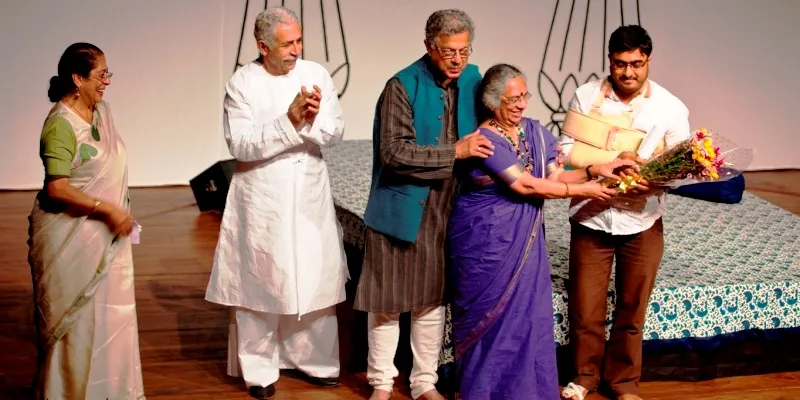
Unfurl your aspirations
Although he himself is quite young, Abhishek's only message to youngsters is to make conscious choices in life. There should be no fear or shame. It is okay to make mistakes, take risks and lose. Finances are subjective. There is no amount of money which makes a person stop worrying about making more money and start focussing on your art. Unless it becomes imperative to do a task, one should not do it.
Our financial model of the world is geared towards encouraging mediocrity. Staying in a certain nominal mediocrity is financially blissful. If I want to make the world's most beautiful hand painted saree, I would spend eight-ten years trying to achieve it and be doomed financially. But if I choose to make simple sarees and manufacture them in bulk, I will make a lot of money. Being in theatre, I can conduct corporate workshops for disinterested students and earn a lot. I consciously avoid that. As long as my basic requirements are met, I am happy. Can I give away my car? Yes. Can I give away my theatre? No.







